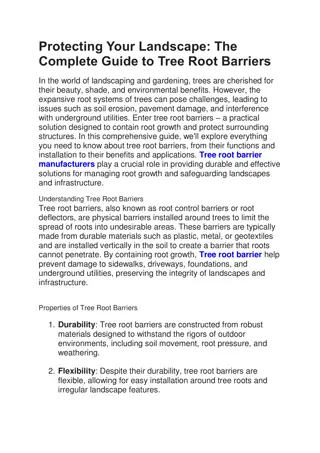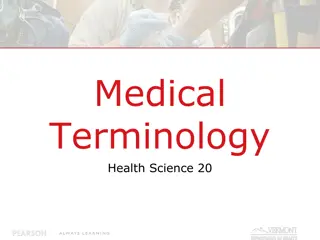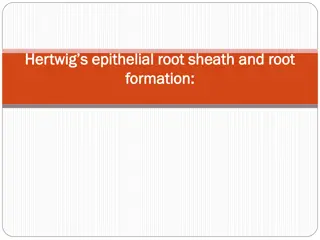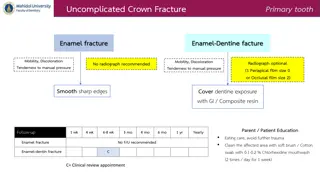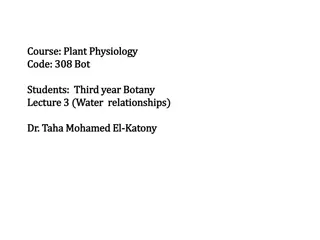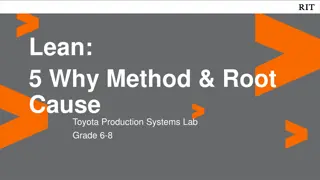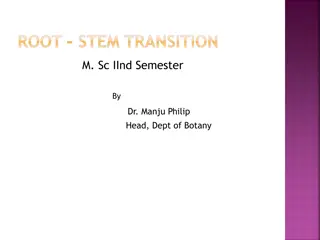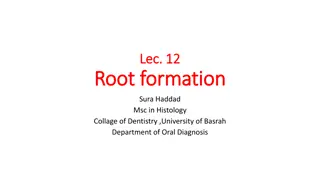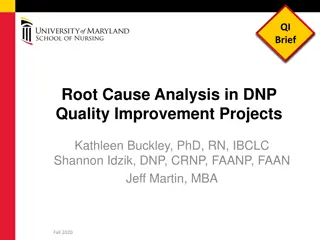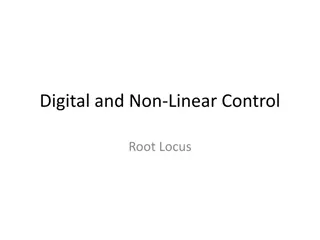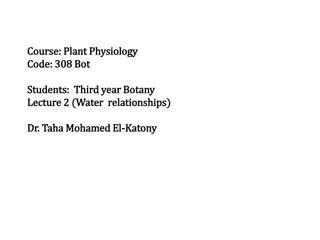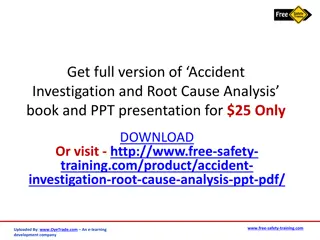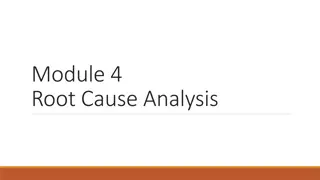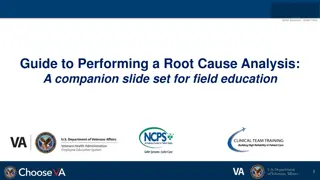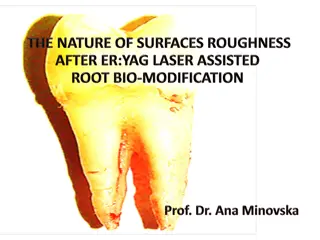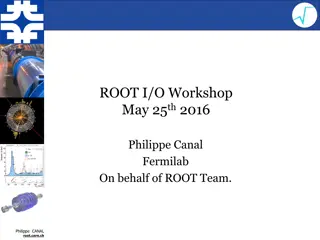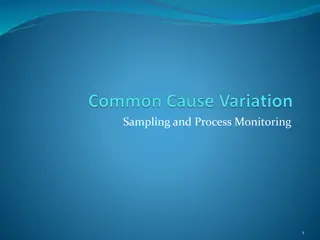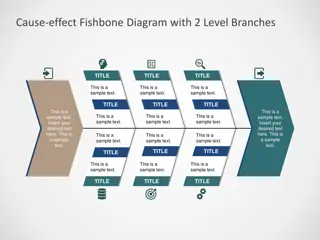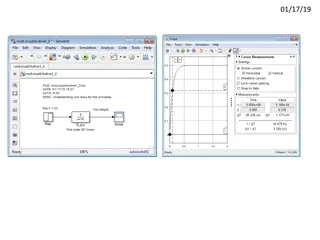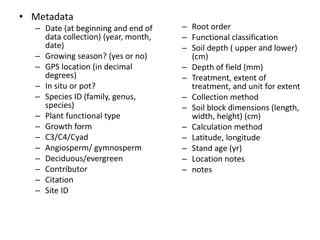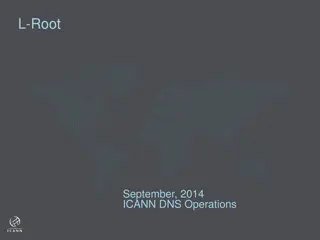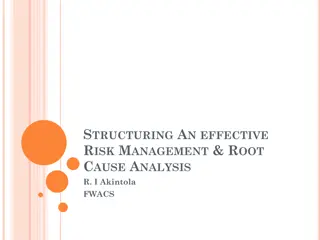Root Cause Analysis for Campaign Challenges
Root Cause Analysis (RCA) is a problem-solving method used to identify underlying causes of key process challenges in campaigns. It helps in learning from bottlenecks and successes to improve future outcomes. This analysis involves understanding what happened, why it happened, and what actions can b
7 views • 18 slides
Protecting Your Landscape: The Complete Guide to Tree Root Barriers
In the world of landscaping and gardening, trees are cherished for their beauty, shade, and environmental benefits. However, the expansive root systems of trees can pose challenges, leading to issues such as soil erosion, pavement damage, and interference with underground utilities. Enter tree root
12 views • 5 slides
Medical Terminology Health Science 20
Medical terminology is a specialized language used in healthcare to describe medical concepts concisely. It consists of prefixes, root words, and suffixes, which can be broken down to define complex terms. Utilizing proper medical terminology enhances communication among healthcare professionals and
3 views • 16 slides
Understanding the Morphology of Flowering Plants: Root and Shoot Systems and Plant Parts
Flowering plants have a typical structure comprising root and shoot systems. The root system is homogenous and consists of roots and branches, while the shoot system is also homogenous and includes the stem, branches, leaves, and flowers. The plant body is divided into vegetative and reproductive pa
0 views • 115 slides
Formation of Hertwig's Epithelial Root Sheath in Tooth Development
The formation of Hertwig's Epithelial Root Sheath (HERS) is crucial in determining the shape, length, and number of roots in teeth. It initiates the formation of radicular dentin, marking the beginning of root development after enamel and dentin formation. HERS consists of outer and inner enamel epi
0 views • 29 slides
Pediatric Dental Crown and Root Fractures Management Guidelines
Guidelines for managing pediatric dental crown and root fractures are provided based on the type and severity of the fracture, along with treatment recommendations, follow-up schedules, and parent/patient education tips. The content covers uncomplicated crown fracture, primary tooth enamel-dentine f
2 views • 9 slides
Effective Root Cause Analysis for Problem Resolution
In the process of determining the root cause of a problem, it is crucial to look beyond initial reactions and symptoms. Root Cause Analysis focuses on identifying underlying factors, not blaming individuals. By analyzing significant events and repetitive errors or failures, a systematic approach can
0 views • 22 slides
Essential Tools for Root Cause Analysis
Root Cause Analysis is a crucial process in problem-solving. Two essential tools discussed here are Brainstorming and the 5 Whys Analysis. Brainstorming involves generating ideas in a group session without criticism, followed by sorting and evaluating these ideas. The 5 Whys Analysis helps to drill
0 views • 19 slides
Understanding Root Pressure in Plant Physiology
Root pressure is the pressure developing in xylem vessels due to metabolic activities of the roots. It is an active process driven by osmotic mechanisms and the absorption of salts by the roots. This pressure plays a key role in translocation of water, affecting factors like respiration, exudation r
1 views • 20 slides
Understanding Root Causes with Lean 5 Why Method
Problems are a part of everyday life, and it's essential for Industrial Engineers to uncover the root causes behind those problems. The Lean 5 Why Method is a powerful tool that helps identify the underlying reasons for issues, enabling the development of effective solutions. By asking "Why?" five t
0 views • 6 slides
Understanding Vascular Transition in Root-Stem Structure
Root and stem in plants form a continuous structure with a transition region between them. The transition involves twisting and inversion of xylem strands, leading to variations in vascular bundles. Eames and Mac Daniels identified different types of vascular transitions in dicots and monocots, each
1 views • 13 slides
Root Development in Tooth Growth Process
Root formation plays a crucial role in the development of teeth, starting after enamel and dentin formation at the cementoenamel junction. Hertwig's epithelial root sheath (HERS) molds the shape of roots, initiating radicular dentin formation. The cervical loop forms an epithelial diaphragm, narrowi
0 views • 23 slides
Root Cause Analysis in Quality Improvement Projects
Explore the significance of analyzing root causes in quality improvement projects, with a focus on tools like fishbone diagrams. Learn why and when to conduct root cause analysis, along with various strategies and tools available for this process. Enhance your understanding of identifying and addres
1 views • 17 slides
Understanding Root Locus Method in Control Systems
The root locus method in control systems involves tracing the path of roots of the characteristic equation in the s-plane as a system parameter varies. This technique simplifies the analysis of closed-loop stability by plotting the roots for different parameter values. With the root locus method, de
0 views • 41 slides
Understanding Water Absorption in Plant Root Systems
Absorption of water by plant roots is a crucial process involving osmosis and gradients. The root system structure plays a vital role in water absorption efficiency, with root hairs being key to this process. Factors such as soil penetration depth and root hair characteristics impact the extent of w
0 views • 21 slides
Root Operations in ICD-10-PCS for Body Part Procedures
An overview of root operations in ICD-10-PCS related to taking out solids, fluids, or gases from a body part, including Drainage, Extirpation, and Fragmentation. Each root operation has specific definitions, examples, and explanations for procedures involving removal or manipulation of solid matter
0 views • 60 slides
Comprehensive Guide to Accident Investigation and Root Cause Analysis
This detailed guide provides a step-by-step approach to conducting accident investigations and root cause analysis, emphasizing the importance of identifying risk control measures and implementing action plans for health and safety improvement. The resources offered include a book and PPT presentati
0 views • 32 slides
Effective Root Cause Analysis for Problem Solving
Explore the importance of Root Cause Analysis (RCA) in identifying, preventing, and treating underlying issues rather than just symptoms. Discover how brainstorming sessions and various RCA tools like 5 Whys and Fishbone Diagrams aid in problem-solving. Learn why RCA matters and how implementing it
0 views • 32 slides
Root Canal Treatment in Hyderabad- Your Guide to a Healthier Smile
Discover the best dental hospital in Hyderabad for your root canal treatment at Hyderabad Smiles. Our expert team ensures painless and effective root canal treatment in Hyderabad using advanced technology. Trust Hyderabad Smiles for top-notch dental
1 views • 3 slides
Chaney root powder is a powerful detoxifying and cleansing herb that
Chaney root powder is a powerful detoxifying and cleansing herb that has been used for centuries. Leafoflifeherbs.com offers the highest quality Chaney root powder available. Do visit our site for more info.
15 views • 1 slides
Vitrage Project Update: Root Cause Analysis Service in OpenStack
Vitrage is an OpenStack service for organizing, analyzing, and expanding alarms and events, providing a holistic view of the system. Founded in Mitaka release, Vitrage became an official project in 2016 with a focus on Root Cause Analysis. It integrates with Mistral for workflow insights and is adva
0 views • 16 slides
Comprehensive Guide to Root Cause Analysis in Healthcare
This guide provides a detailed overview of Root Cause Analysis (RCA) in healthcare, emphasizing the importance of identifying basic causal factors underlying system failures to improve patient safety. It covers the purpose of the guidebook, when an RCA is necessary, characteristics of an RCA, and th
0 views • 52 slides
Understanding Root Surface Modifications in Periodontal Therapy
Periodontal therapeutic modalities focus on root surface modifications due to periodontitis, which involves physical, chemical, and cytotoxic changes. Successful outcomes depend on factors like clot stability, cell migration, attachment, proliferation, and debridement. Analyzing cementum properties
0 views • 6 slides
Understanding Materials Used for Root Canal Filling
The final step in endodontic treatment involves root canal filling, aiming to prevent exchange between the canal and periodontium. Pulpectomy is indicated for various dental conditions and is carried out in interim or permanent teeth. Different methods of devital extirpation are utilized in the proc
0 views • 16 slides
Update on ROOT I/O Workshop Efforts and Recent Additions
Efforts dedicated to improving ROOT software include memory management enhancements, caching advancements, and a new post-compile analyzer. Recent additions focus on memory leaks, TTree optimizations, and performance improvements for ROOT-based projects. Progress has been made towards zero-copy I/O
0 views • 11 slides
Root Cause Analysis Template for Driving and Releasing Change
Root cause analysis template for understanding problem causes, suitable for anyone with a defined scope. Learn how to develop a shared problem understanding, identify causes, find root cause using 5 whys, and generate solutions. Contact us for template design queries.
0 views • 4 slides
Understanding Cause Analysis in Problem Solving
Cause analysis, or CA, is a vital tool for investigating incidents, identifying underlying causes, and implementing corrective actions to prevent recurrence. By delving deep into the root causes of problems, CA enables organizations to make effective recommendations and address issues at their sourc
0 views • 12 slides
Understanding Common Cause Variation in Sampling and Process Monitoring
Common cause variation is inherent to a process and represents background noise that can obscure signals of special cause variation. Sampling plans and rational subgrouping help estimate and manage common cause variation in quantitative data. Estimating common cause involves assessing variation with
2 views • 11 slides
Engaging Workshop: Root Cause Analysis for Public Engagement Activities
Explore self-directed activities focused on root cause analysis for designing public engagement activities. Learn how to identify development issues, conduct a 5 Whys analysis, and challenge assumptions to design solutions effectively. Engage in hands-on activities to address societal challenges thr
0 views • 13 slides
Understanding Cause and Effect Relationships
Understand the concept of cause and effect, where a cause triggers an effect. Causes precede effects, and to determine the cause, ask "Why did it happen?" Effects follow causes and can be determined by asking "What happened?" Explore examples, signal words, and practice scenarios to enhance your und
0 views • 5 slides
Various Quality Improvement Diagrams for Root Cause Analysis
Explore a series of quality improvement diagrams such as fishbone diagrams, cause-and-effect flow charts, error reduction improvement diagrams, and root cause analysis steps. These visual tools offer insights into identifying and addressing root causes of issues in different processes or systems.
0 views • 12 slides
Chaney Root Powder | Leafoflifeherbs.com
Chaney root powder is a powerful detoxifying and cleansing herb that has been used for centuries. Leafoflifeherbs.com offers the highest quality Chaney root powder available. Do visit our site for more info.
1 views • 1 slides
Understanding Root Locus Plots for Control Systems
Exploring the concept of root locus plots in control systems through a detailed analysis of feedback systems, rise time optimization, steady-state errors, and closed-loop response predictions. The content discusses the impact of varying proportional gain on system performance, practical examples fro
0 views • 20 slides
Root Morphology and Chemistry Data Collection in Plant Study
This dataset includes detailed metadata on root characteristics, such as diameter, branching intensity, mycorrhizae type, along with root chemistry data like nutrient concentrations and stable isotopic values. Soil dynamics, including temperature and texture, and climate information are also documen
0 views • 4 slides
Root Zone Management Changes Process Overview
Understanding how changes to root zone management are requested, the transition from NTIA oversight, and the role of the Root Zone Evolution Review Committee (RZERC) in advising the ICANN Board on root zone management changes.
0 views • 7 slides
Exploring Disproportionality in Education: Root Cause Analysis and Data-Driven Decision Making
Delve into the complexities of educational disproportionality through the lens of root cause analysis and data-driven decision making. Discover ways to address issues of representation and identification in special education, while considering the impact of deep-rooted factors on outcomes and dispar
0 views • 27 slides
Understanding L-Root: An Overview of ICANN DNS Operations
Explore the world of L-Root, one of the 13 independently operated root servers serving the DNS root zone. Learn about its operational details, geographical diversity via Anycast, global locations, and the process of hosting an L-Root instance on your network. Discover how Anycast improves user exper
0 views • 15 slides
Interactive Fishbone Diagram Template for Collaborative Root Cause Analysis
This fishbone diagram template styled like a whiteboard is perfect for teams looking for a dynamic approach to root cause analysis. It encourages interactive problem-solving sessions through brainstorming and collaboration, featuring color-coded sticky notes for visual organization and simplifying c
0 views • 6 slides
Maize Root Anatomy: An In-depth Examination
Maize root anatomy involves various specialized structures such as the epidermis, cortex, endodermis, pericycle, and vascular tissue. The epidermis is crucial for absorption and protection, while the cortex plays a role in providing support and storage. The endodermis acts as a barrier and regulates
0 views • 9 slides
Effective Risk Management & Root Cause Analysis Overview
Understanding risk management and root cause analysis is crucial for healthcare providers to enhance patient safety and mitigate potential hazards. Risk identification, analysis, evaluation, and treatment methods are essential components of an effective risk management process. Awareness of patient
0 views • 45 slides

